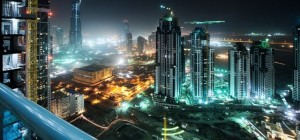By Tafline Laylin www.greenprophet.com
Dubai is nothing at all like Las Vegas. Though both are unlikely cities in waterless environs and full of people eager to divest visitors of both their souls and their money, that is where their likeness ends.
 As a tour leader for Trek America, I survived many weekends scratching the tacky surface of LV’s wholesale debauchery, but those dark nights of the soul don’t compare at all to how another desert city half way across the world makes a nature-lover feel.
As a tour leader for Trek America, I survived many weekends scratching the tacky surface of LV’s wholesale debauchery, but those dark nights of the soul don’t compare at all to how another desert city half way across the world makes a nature-lover feel.
What strikes me most is the city’s sheer scale. Last night a friend and I traveled by metro from Karama station south to Dubai marina, a 40 minute trip. We passed the world’s tallest tower. Passed the Burj Al Arab, a giant hotel shaped like a sail. Passed the indoor ski arena. We kept passing more and more towers.
Eventually we arrived at our stop. After getting off the metro and looking around at yet more towers, more restaurants, boats, and all kinds of glass and cranes and metal, I looked to my friend Rob Ferry and asked:
“Where are we?”
“Oh. This is a whole new city,” he said.
Before the economic crash that effectively drew construction to a screeching halt, developers in Dubai were falling over one another to build the most striking buildings – each outdoing the other to attract would-be customers. And many really are quite striking.
But there are literally hundreds upon hundreds of them. Walking at their feet, I feel like an ant. The awesome mass of buildings is overwhelming – especially in a city that has no water except that which is sucked out of the Gulf every year, and which at the first hint of summer is already so hot that my calves retain water like giant fire hydrants. (Very attractive.)
In order to pay back these incredible extravagances, an army of Bill Gates would have to converge on Dubai for a decade of conferences. (That’s a metaphor. I have no idea how many Bill Gates this city needs.) Instead, the inevitable financial crash caused an exodus of expatriates who left in their wake miles of mostly uninhabited, often incomplete towers.
Just how scarce money has become at the poorer end of society became especially clear at the end of the evening, when we climbed into a taxi to ride back to the Karama area.
Before the taxi driver could pull out of the hotel lot, another, older man ran towards us, waving his fists in the air.
“You took my fare,” he yelled. “I was waiting and you drove in and took them.”
While they argued, Rob and I moved into the elder man’s taxi and gave him our address. But as he began to drive off the younger fellow blocked us with his vehicle and a big shouting match ensued between them. After a minute or two of this, we climbed out yet again and neither driver earned our fare. All this unhappiness for less than $20.
For someone who prefers tents to marble, grass to concrete, and fresh air to smog, Dubai feels like a near-apocalypse, a no-place of confused identity that has reduced some of its poorest to fighting like feral cats for scraps.
















